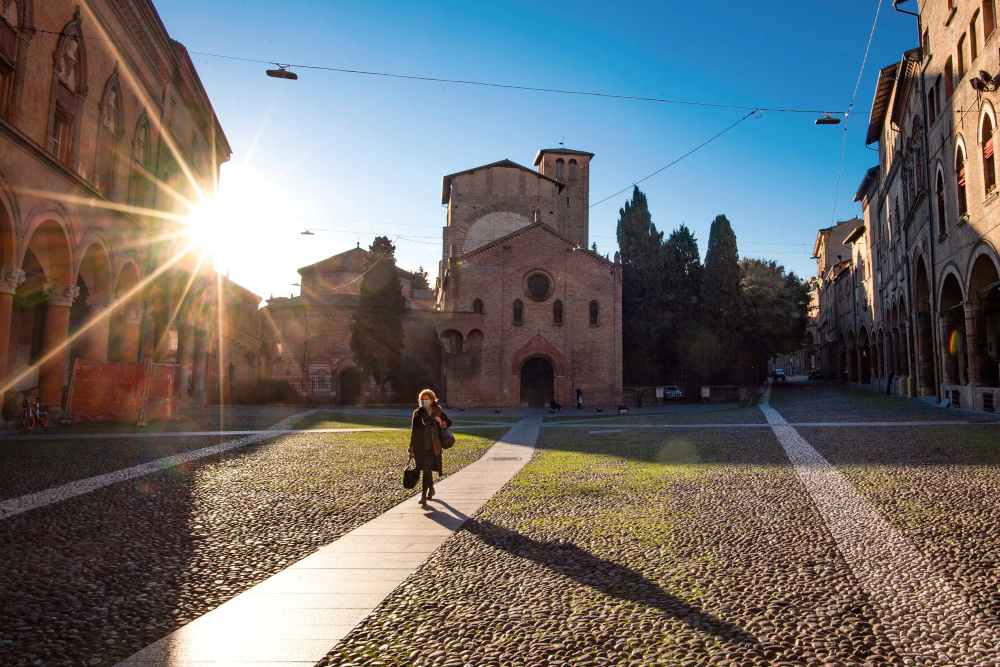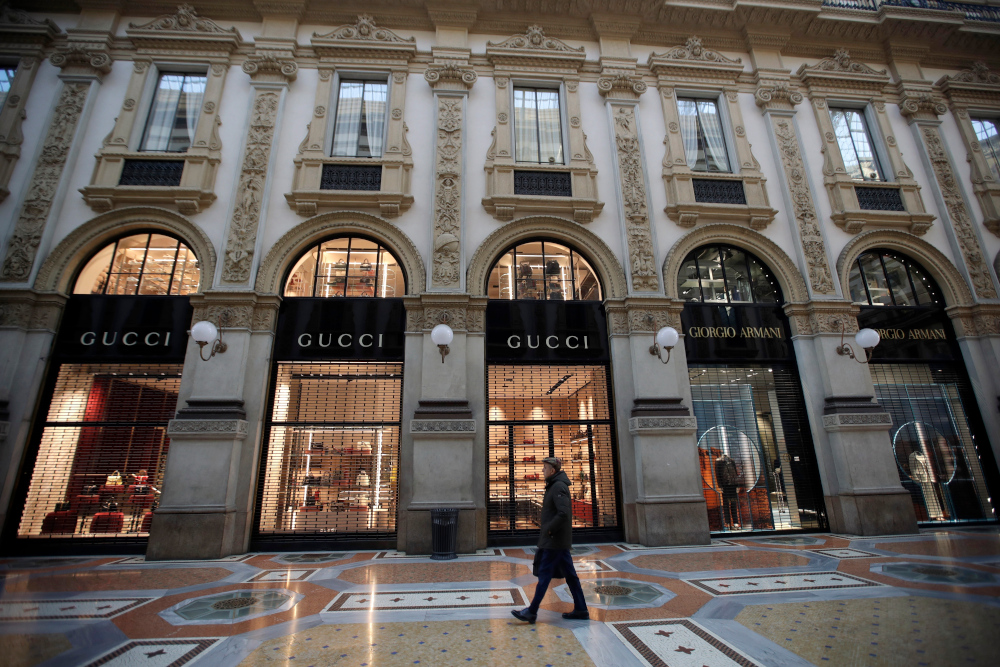
A woman walks past the Basilica of Santo Stefano, in Bologna, Italy, Wednesday, March 11, 2020. In Italy the government extended a coronavirus containment order previously limited to the country’s north to the rest of the country beginning Tuesday, with soldiers and police enforcing bans. For most people, the new coronavirus causes only mild or moderate symptoms, such as fever and cough. For some, especially older adults and people with existing health problems, it can cause more severe illness, including pneumonia. (Ap/LaPresse/Massimo Paolone)
Italy mulled imposing even tighter restrictions on daily life and announced billions in financial relief March 11 to cushion economic shocks from the coronavirus, its latest efforts to adjust to the fast-evolving health crisis that also silenced the usually bustling heart of the Catholic faith, St. Peter’s Square.
Premier Giuseppe Conte said he will consider requests to toughen Italy's already extraordinary anti-virus lockdown that was extended nationwide March 10. Lombardy, Italy's hardest-hit region, is pushing for a shutdown of nonessential businesses and public transportation cutbacks.
These additional measures would be on top of travel and social restrictions that imposed an eerie hush on cities and towns across the country from March 10. Police enforced rules that customers stay 1 meter (3 feet) apart and ensured that businesses closed by 6 p.m.
But Conte said fighting Italy's more than 10,000 infections — the biggest outbreak outside of China — must not come at the expense of civil liberties. His caution suggested that Italy is unlikely to adopt the draconian quarantine measures that helped China to push down new infections from thousands per day to a trickle now.
China's new worry is that the coronavirus could re-enter from abroad. Beijing’s city government announced that all overseas visitors will be quarantined for 14 days. Of 24 new cases that China reported March 11, five arrived from Italy and one from the United States. China has had over 81,000 virus infections and over 3,000 deaths.
For most, the coronavirus causes only mild or moderate symptoms, such as fever and cough. But for a few, especially older adults and people with existing health problems, it can cause more severe illnesses, including pneumonia. More than 119,000 people have been infected worldwide and over 4,200 have died.
But the vast majority of people recover. According to the World Health Organization, people with mild illness recover in about two weeks, while those with more severe illness may take three to six weeks to recover.
For the global economy, the repercussions are profound, with increasing concerns of wealth- and job-wrecking recessions.
Italy's government announced it is earmarking 25 billion euros (nearly $28 billion) to boost anti-virus efforts and soften economic blows, including delaying tax and mortgage payments by families and businesses.
Normal life was increasingly being upended.
With police barring access to St. Peter’s Square, emptying it of tens of thousands of people who usually come on Wednesdays for the weekly papal address, Pope Francis instead livestreamed prayers from the privacy of his Vatican library.
Athletes who usually thrive on crowds grew increasingly wary of them. Spanish soccer club Getafe said it wouldn't travel to Italy to play Inter Milan, preferring to forfeit their Europa League match rather than risk infections.
Olympic champion skier Mikaela Shiffrin said she would be limiting contacts with fans and fellow competitors, tweeting that “this means no selfies, autographs, hugs, high fives, handshakes or kiss greetings.”

A man walks along the Vittorio Emanuele shopping arcade, in Milan, Italy, Wednesday, March 11, 2020. In Italy the government extended a coronavirus containment order previously limited to the country's north to the rest of the country beginning Tuesday, with soldiers and police enforcing bans. For most people, the new coronavirus causes only mild or moderate symptoms, such as fever and cough. For some, especially older adults and people with existing health problems, it can cause more severe illness, including pneumonia. (AP/Luca Bruno)
In the U.S., the caseload passed 1,000, and outbreaks on both sides of the country stirred alarm.
In Europe, deaths soared among Italy's aging population. Authorities said Italy has suffered 631 deaths, with an increase of 168 fatalities recorded March 10. In Spain, the number of cases surged past the 2,000-mark on March 11. Belgium announced its first virus-related death, of a 90-year-old woman.
“Right now, the epicenter — the new China — is Europe,” said Robert Redfield, the head of the U.S. Centers for Disease Control and Prevention.
Markets across Asia dropped March 11 despite Wall Street’s gains a day earlier. Investors seemed encouraged by promises by U.S. President Donald Trump of a relief package to cushion economic pain from the outbreak. Governments around Asia and elsewhere have also announced billions of dollars in stimulus funds, including packages revealed in Japan on March 10 and Australia on March 11.
“The world is facing a medical emergency that monetary and fiscal policy cannot fix,” said Holger Schmieding, chief economist at Berenberg private bank.
Disruptions grew for travel and schools. Ukraine joined more than a dozen other countries in closing all schools, kindergartens and universities .
In the U.S., dozens of cases were being tied to a conference in Boston, and leaders in multiple states were announcing curbs on large events. Colleges emptied their classrooms as they moved to online instruction and uncertainty surrounded the upcoming opening of the major league baseball season and college basketball’s championships. Even the famed buffets of Las Vegas were affected, with some of the Strip’s biggest being closed as a precaution.
“It’s terrifying,” said Silvana Gomez, a student at Harvard University, where undergraduates were told to leave campus by March 15. “I’m definitely very scared right now about what the next couple days, the next couple weeks look like.”
New York’s governor said National Guard troops would scrub public places and deliver food to a suburb where infections have spiked. In Washington state, where a Seattle-area nursing home was the center of an outbreak, officials said the virus had spread to at least 10 other long-term care facilities. In California, thousands of restless passengers remained stuck aboard a cruise ship, waiting for their turn to get off and begin quarantines.
Former U.S. Vice President Joe Biden and Sen. Bernie Sanders, who are vying to take on Trump in the presidential election, abruptly canceled rallies March 10 and left open the possibility that future campaign events could be impacted, too. Trump's campaign insisted it would proceed as normal, although Vice President Mike Pence conceded future rallies would be evaluated “on a day to day basis.”
It was all evidence of the continuing westward push of the virus.
In China, the province at the center of its virus outbreak said manufacturers, food processors and other businesses deemed essential to the economy or providing daily necessities can resume operation.
The other major outbreak site in Asia, South Korea, continued to report improving numbers, too, with 242 new cases. Still, a cluster of infections connected to a call center in one of the busiest areas of Seoul raised alarms.
Advertisement







